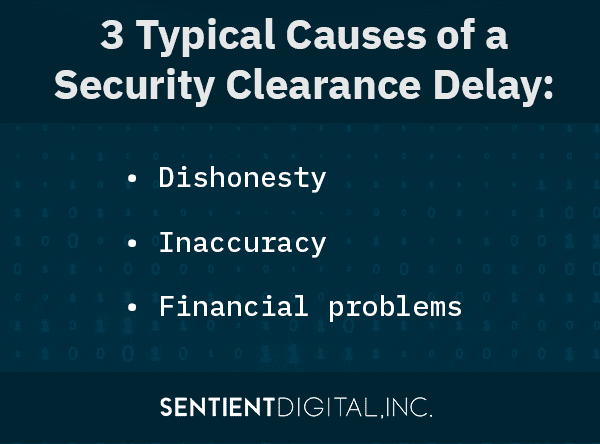Wondering what can delay a security clearance? If you’re wondering what might cause delays or even denials, you’re not alone. There comes a time in the career of most technology professionals when a job opportunity requires you to have a security clearance. In fact, depending on the organization, a security clearance or the ability to obtain one can be one of the most important qualifications tech recruiters look for. This happens on a fairly regular basis when working in the defense industry or government IT. Unfortunately, if you aren’t careful, it can be all too easy to cause security clearance delays—or, in some cases, even get your security clearance denied.
The review process can take a long time, but to avoid making it any longer than necessary, be aware of these 3 typical causes of a security clearance delay:
- Dishonesty
- Inaccuracy
- Financial problems
These reasons may seem obvious, but there are some unexpected pitfalls you will want to avoid. To help you out, we’ve compiled a list of the top 3 ways to avoid security clearance delays and an explanation of 5 causes of security clearance denial, plus some additional tips to help you feel ready for the review process. Learn how to avoid these common mistakes today and get your security clearance decision in a more efficient manner.
Why You Need a Security Clearance
You may be wondering if taking on the potential hassles of applying for a security clearance is worth it, but there are many benefits of obtaining a security clearance in the IT industry. The most important reason is to open up more job opportunities to yourself; many IT careers require a security clearance and you simply will not qualify without one. Keeping in mind the many good reasons to seek a security clearance for IT work will help you to stay motivated through what will likely be an arduous process.
Acquiring a security clearance is a necessity for any IT pro looking for the widest array of job opportunities. A few of the top reasons to pursue a security clearance include:
- The demand for cleared IT professionals remains high. Due to what has sometimes been a shrinking talent pool and delays in the security clearance process, opportunities abound for tech pros with a current and active security clearance. In fact, it makes perfect sense to go ahead and earn one, even if you aren’t currently looking for an IT job where it’s a requirement. You never know when your situation might change, and it’s better to get a clearance now if you anticipate working in government or defense IT in the future.
- You can earn a higher salary with a security clearance. According to a recent study, IT pros with a secret clearance earn a nearly 6% higher salary compared to those without one. That number increases to almost 13% for those with a top secret security clearance.
- You can expect a more robust benefits package. In addition to a higher salary, IT professionals working for companies serving the defense and government IT sector also enjoy better job benefits. Relocation assistance and on-site daycare help workers with families. Tuition reimbursement provides a career ladder for technology pros looking to further their education. The availability of a transit subsidy also helps those tech pros commuting in the nation’s capital.
- Having a critical mission can improve job satisfaction. A recent survey of security-cleared tech professionals revealed the importance of meaningful work. The relevance of the mission-critical work being performed by those in government IT cannot be overstated. Earning a security clearance helps you truly make a difference when your country needs it. Ultimately, becoming a security-cleared tech professional is your ticket for career-long success and fulfillment.
These are just some of the many reasons that IT professionals should consider seeking a security clearance. Without a security clearance, the number of jobs you can apply for will be smaller and you will be less competitive for them. This makes it worth going through the application process, even though it may take a long time.

What Can Delay A Security Clearance?
No matter your reasons for trying to get one, it’s important to ask, “What can delay a security clearance?” Understanding the potential hiccups can help you set your application up in a way that makes it simpler to review. Even at its best, obtaining a security clearance is a months-long process that involves many moving parts. From completing an SF-86 to sitting down with an investigator, it can be an overwhelming venture. So, what can an applicant do to prevent security clearance delays? Researching the process in advance is a good start. If you understand what recruiters consider red flags, as well as some issues that may require additional follow-up that takes time, you will have a better chance of mitigating the potential source of delay. Here are three useful tips to help you avoid unnecessary security clearance delays.
3 Tips To Avoid A Security Clearance Delay
1. Don’t Lie or Try to Rewrite History
Clearance investigations take a very detailed look into the life of an applicant. No matter how honest or upstanding an applicant is, no one is perfect. We have all done things we regret in life, especially youthful indiscretions. Since a clearance investigation covers a good portion of an applicant’s adult life, it is important to realize that past problems, issues, and concerns may come up in the process. An applicant should be prepared to answer questions regarding old run-ins with the law (disorderly charges or theft) or academic behavior (cheating on tests in college or being accused of plagiarism).
If an applicant has had issues in their past, they should address them head on and with complete honesty to prevent security clearance delays. Even holding back relevant information could hold up your application, so be forthcoming to prevent this cause of a security clearance delay. In the case of clearance investigations, honesty is the only policy – especially if an applicant wants their clearance to go through quickly and smoothly.
2. Provide Accurate Information, Especially on the SF-86
The background check form you will have to complete, SF-86, is the holy grail of the security clearance process. This one form will drive the course of an applicant’s investigation. Ultimately, if it is less-than-accurate or full of errors, it will mean the investigation will be problematic, as your investigation cannot proceed without complete and accurate information. Thus, applicants should ensure all information provided is current, correct, and complete to avoid snags in the investigation process.
Moreover, when providing the contact information for references, make sure to provide up-to-date contact numbers and addresses to prevent security clearance delays. Providing an investigator with old contact information only causes the investigator to waste their time and slow the investigation down. An applicant should reach out to their references and get the most accurate contact information, and also let the reference know someone will be reaching out to them.
3. Know Your Financial Situation
Part of a security clearance investigation focuses on an applicant’s financial background. Knowing if there is reason for concern that an applicant would be open to exchanging information for money due to financial distress is a key element of the security clearance review process. Thus, before an applicant applies for a clearance, it is wise to pull a current credit report to make sure it is accurate. Pulling a credit report beforehand allows an applicant to contact credit bureaus to correct any invalid information before it causes problems during an investigation. Also, an applicant should make a list of all bank accounts, assets, and liabilities to get a full grasp on their financial profile. Also, make sure you can explain any issues and what actions you have taken to mitigate them, so that your investigator can take that into account.
5 Reasons Your Security Clearance Could Be Denied
You need to ensure your background is clean before even applying with government or defense companies, as they will likely do a background screening before hiring you and before the security clearance process is even started. By “clean” we do not mean everything has to be perfect (again, be forthcoming about your past), but certain issues do make denial more likely. Here is a list of some factors that typically lead to a denial of security clearance.
1. Significant Financial Problems
It may surprise you to learn that almost half of all security clearance denials are related to the applicant’s financial situation. If you currently hold a lot of debt, or worse yet, have recently filed for bankruptcy, your chances of a security clearance being denied are high. Other related issues causing harm include tax liens, collections, foreclosures, and a history of gambling. Keeping a spotless credit and financial record is a must for a quicker review process. How bad credit will affect your application for a security clearance depends on your individual situation.
If you’re wondering about the justification for these concerns, the government views your financial situation as reflecting your ability to make responsible decisions. Additionally, if people have a certain level of financial difficulty, they may be more susceptible to offers of financial assistance or rewards, from foreign agents. In any case, it’s best to have a sense of your personal financial situation going into the application process and to be as forthcoming as possible about your situation and any corrective actions you are taking as possible.
2. Certain Mental Health or Personal Issues
A history of depression and/or another mental illness probably won’t harm your chances of a clearance, provided you are on medication or have sought counseling or other forms of help to navigate and deal with the diagnosis. Larger issues, however, just might. These circumstances include incidents of violent behavior or exhibiting signs of paranoia.
When it comes to personal issues, maintaining a relationship with a known criminal is another popular reason for denial.
3. Criminal Activity
It’s not surprising that criminal activity is a leading reason for the denial of security clearance. A singular misdemeanor might not cause an issue, but a history or pattern of misdemeanors or a felony will likely ruin your chances. A dishonorable discharge from the military also applies, depending on the reasons behind the incident.
4. Drug or Alcohol Abuse
A history of drug or alcohol abuse is another popular reason professionals are unable to get a security clearance. This includes DUIs or other related incidents on a candidate’s record. An exception is sometimes made if the problem happened years ago, and the person in question now maintains a life of sobriety. Remember that even one-time use of certain drugs may disqualify you. Regardless, you will need to be forthcoming on your application about your history of using drugs or alcohol.
5. Falsifying Information When Applying for a Clearance
Honesty is extremely important when applying for a security clearance. Expect all the information in your application to be extensively researched, and any discrepancies or falsifications will put your clearance at risk. Include all information on your application, along with negative items. An omission is another form of falsification, after all. Remember, the purpose of a security clearance is to illustrate your trustworthiness, so dishonesty just doesn’t make sense.
If you have something in your background that you think may cause an issue, a better approach is to provide an explanation, any mitigating factors, information about your progress since then, and supporting documentation as much as possible. Providing this information up front may help those reviewing your application to answer questions they may have, or at least to get started on gathering the appropriate information. Also, keep in mind that you have the option to consult an attorney for legal advice about your specific situation.

Additional Reasons Delays May Occur
In addition to some of the more extreme reasons a security clearance might be delayed, such as dishonesty, some of the less obvious reasons for review delays may surprise you. Here are some more innocuous circumstances that can result in a security clearance delay.
Fingerprints That Are Not Readable
Fingerprint issues are a surprisingly common reason that security clearance applications may take longer than necessary. For example, if your fingerprints are done with ink rather than digitally, they may smudge, so it’s best to have them done via the digital method when possible. This can help you avoid a delay caused by having to get your fingerprints redone.
Extensive International Travel
Do you live to travel? If you take a lot of trips abroad, this can delay your security clearance. Obviously, there is nothing inherently wrong with traveling internationally, but the investigator will want to know the reason for these trips, among other details. One exception may be trips that were required for your work for the U.S. government.
In order to help your investigator get through this part of the review as quickly as possible, keep track of your international travel, with details including the start and end dates of the trip, the addresses where you stayed for more than 90 days and the landlord’s contact information for those locations.
Contact with Foreign Nationals
Do you enjoy chatting with friends who include some people who are not nationals of the United States? Your application could be delayed if you do not provide information about these contacts. There is always a concern that a foreign national could exert influence on a person seeking security clearance, so this information is relevant. Once again, recordkeeping can be your best friend here. Keep track of your foreign contacts so that you can provide information about them upfront. As always, do not lie about this information. Again, there is nothing inherently wrong with having friends abroad, but your application investigator may want to know about them.
Social Media Activity
Social media is so widespread that you may already know to be careful about what you say online. However, your security clearance investigator may look not only at what you say on social media, but what others say, either on your page or in posts that you have liked, for example. It is possible to lose your security clearance for failure to remove comments from others with objectionable content, so it stands to reason that this would be considered in the application process as well.
What kind of content poses a problem? Obviously, posts that advocate for governmental upheaval, violence, and so on, but there may not be a bright line rule here. It’s probably best to remove anything from others on your profiles that you think might cause a problem, avoid interacting with questionable accounts and posts, and avoid posting anything questionable yourself.
More Helpful Tips For A Smoother Review Process
Now that you know what to avoid, here are some additional proactive tips that can help you to have a smoother experience with the review process.
Prepare Those Around You
As noted above, your connections matter to your security clearance application investigator. Your investigator may want to interview your coworkers, family, neighbors and others, so it’s best to be prepared. Make sure you have updated contact information for everyone. Let them know you are applying for a security clearance and they may be contacted.
Prepare For Your Interview
The investigator will also interview you, so be ready to talk clearly and honestly about all aspects of your application. However, if you don’t know something, be honest about that too. The interviewer will sometimes want to have more than one interview with you to get all of the information needed, so the process has a built-in understanding that not everything may be available right away. Regardless, the most important thing is to be honest, because dishonesty is a much bigger deal than incomplete information. Research the kind of things you may be asked about and you will feel much more prepared.
Keep Track of Where Your Application Stands
As your investigator is reviewing your application, you can view its status via updates that the Defense Security Service will send you. Critically, these updates include whether certain items in your application are “unacceptable,” which means your application is incomplete. This will let you know whether anything else is needed from you before the investigation can proceed.

Get Help with Your Job Search and Find Security Clearance Jobs
If you need advice on becoming security cleared for government and defense technology work, the experts at Sentient Digital, Inc. can help. The process to obtain a security clearance is a complicated one, with many moving parts that can be difficult to navigate on your own and without past experience. At Sentient Digital, Inc., we are proven leaders in the recruitment of professionals in IT for the defense contracting industry. Contact us today to learn more!
Since we provide technology solutions for government and military clients, as well as the private sector, we also frequently hire for roles that require a security clearance. Learn more about working at Sentient Digital and check out our current job postings today.




